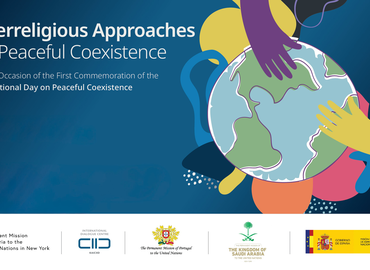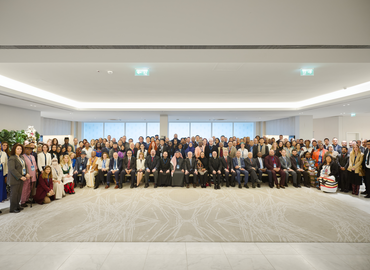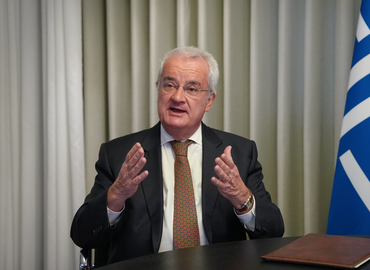A Guiding Light: How Faith Leaders Can Promote Good Governance

In the pursuit of good governance, there’s little doubt that religion can play an important role. Honesty, integrity, selflessness – values espoused by faith groups globally – are, after all, key tenets of right-minded policymaking.
Woven into the fabric of the world’s religious traditions, there are lessons in countering corruption and the need for transparency, in the value of equality and the importance of the rule of law. With COVID-19 straining the seams of social cohesion and threatening public trust in political institutions, engaging lawmakers with these ideals is more important than ever.
That, according to members of the European regional consultations – one of several working groups of experts who gathered together ahead of this year’s G20 Interfaith Forum to provide targeted recommendations on good governance – is why faith communities and leaders must “refuse to cooperate, even indirectly, with corrupt regimes or practices in the public or the private sector,” and instead work to foster the advance of fair, inclusive policies.
When it comes to the equitable distribution of goods and resources, this is particularly true, experts say. “Charitable giving has always been a key concern in many religious teachings, seeking to ensure that ‘those with’ do not leave ‘those without’ bereft of food, shelter, or clothing,” explained Paul Hedges, a professor of interreligious studies at the S. Rajaratnam School of International Studies, NTU, Singapore and participant in the G20 Asia regional consultations.
Extending this notion of communal care and social responsibility has become increasingly pressing in recent months, as the pandemic and its associated privations have come to bear on the most vulnerable in society. With the closure of businesses, schools, houses of worship, and – in some places – the wholesale suspension of public life, the fundamental rights of some of the world’s poorest or most marginalised citizens have been threatened by virus containment measures. On this, faith groups have an opportunity to be vocal.
“While human rights is a new concern, so not addressed directly by most religions, a strong concern in many traditions has been human dignity. Looking at traditional teachings on respecting the dignity of all persons, including the poor and dispossessed, can be one way that religious leaders can encourage human rights thinking,” said Hedges.
This is true particularly in Latin America, an area beset by “various degrees of political instability and violence, which is symptomatic of an ongoing crisis of representation and of our democratic systems,” according to participants at the G20 regional consultations.
Though deeply rooted in the region’s colonial history, these issues have been inflamed in recent times by the rise of populist movements, the panel of experts reported last month.
“Such movements may seek to impose unilateral rule over legislatures, judiciaries, and freedom of speech, with scant regard for minorities and independent checks and balances, twisting the very notion of democracy itself,” members of the European regional consultations concluded.
To address this, faith communities must resist the efforts of authoritarian regimes to use religious discourse to legitimise their positions, and in doing so fight to preserve the rule of law and human rights.
This isn’t always easy, however. In many parts of the Arab region – an area plagued by instability and conflict – religious institutions have found themselves marginalised by state authorities, weakening their ability to foster good governance. Indeed, faith organizations are all too often restricted solely to their traditional role of providing religious education, experts at the G20 Arab Region consultations reported.
Correcting this requires a rethink in how faith groups communicate with state actors. “[Religious leaders must] simplify their language of discourse and depart from complex concepts and theoretical approaches in order to ensure that their message reaches all groups and segments of society,” the panel of Arab Region experts concluded.
Optimistically, to the south, in Sub-Saharan Africa, religious institutions are setting an example for lawmakers to follow. The continent’s western nations are in the throes of a food crisis, with tens-of-millions of people facing starvation. With the spectre of COVID-19 threatening to inflame an already desperate situation, the Episcopal Conference of Senegal, Mauritania, Cape Verde and Guinea-Bissau this year resolved to create its own emergency fund – financed through voluntary contributions – with a view to bringing food relief to the most needy.
This initiative, and others like it, offer hope to those facing unfathomable hardship. But for lasting, structural change, many believe the international community must address that which underlies the developing world’s endemic suffering: economic frailty.
For Dr Martin Pascal Tine, the Senegalese Ambassador to the Holy See, this should start with debt cancellation, something he believes religious leaders can help endorse with their promotion of “justice and equity”.
“To do this, it would be necessary to promote an ecumenical reading of sacred texts devoid of any fundamentalism and to further emphasise this idea of human fraternity in an interdependent world,” Tine said.
The onset of COVID-19 has placed fresh urgency upon debt relief calls, with Pope Francis last month insisting that “policy, legislation and investment must be focused on the common good and guarantee that global social and environmental goals are met."
On the latter point, environmental policy, Tine concludes that faith groups can be a driving force of good governance. Of this, Africa’s ‘Great Green Wall’ scheme – which has interreligious support – is a prime example.
Launched by the African Union, the initiative aims “to restore 100 million hectares of currently degraded land; sequester 250 million tons of carbon and create 10 million green jobs,” in one of Africa’s poorest regions, according to the United Nations Convention to Combat Desertification.
Tine believes this is a prime example of how regional religious leaders and institutions can support much-needed governmental policies which target fundamental structural problems such as hunger and unemployment.
“The Great Green Wall will contribute to ensuring food security, jobs, and a hospitable environment for people from Senegal to Djibouti.”

As discrimination, hate speech and identity-based violence…

- KAICIID marks 10 years of global peacebuilding, uniting over 130 leaders in…

